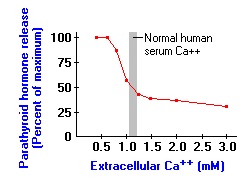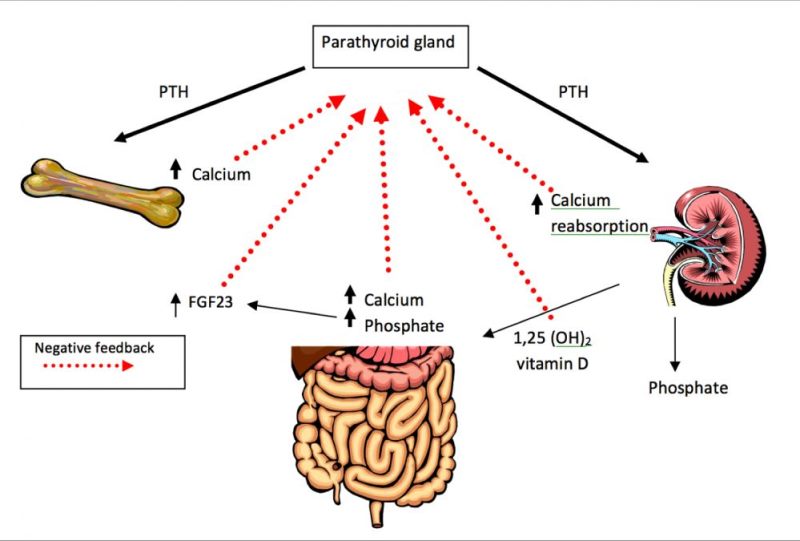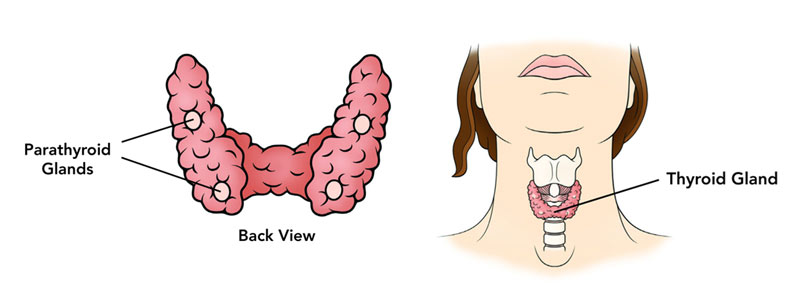How the Parathyroid Glands Work
The parathyroid glands are a very interesting organ. They have a very important job all their own, but are often overshadowed by the gland where they call home, the thyroid.
On the back of the thyroid gland are four very small parathyroid glands the size of a grain of rice. Each one is positioned at the top and bottom of the rear of the thyroid on either side of the windpipe.
These tiny glands produce PTH, also known as parathormones. The parathyroids are responsible for creating the calcium and phosphorous in the hormone secretions that help the nervous system and heart perform properly, and bones stay strong and supple.
Parathyroid Gland Function
The parathyroid glands monitor the calcium in the blood 24 hours per day. The four parathyroid glands make more or less PTH in response to the level of calcium in the blood. Normally, parathyroid hormone release is triggered when the level of calcium in the blood is low. When the calcium level rises and is back to normal, the release of parathyroid hormone from the parathyroids is reduced. The blood calcium level is the main stimulus for the release of parathyroid hormone. The release of PTH is not controlled by the pituitary gland.

When the calcium level is high in the bloodstream, the thyroid gland releases calcitonin. Calcitonin slows down the activity of the osteoclast cells found in bone. This decreases blood calcium levels. When calcium levels decrease, this stimulates the parathyroid gland to release parathyroid hormone.
Parathyroid hormone encourages the normal process of bone breakdown (essential for maintenance and growth of the bone). This process of bone breakdown releases calcium into the bloodstream. These actions raise calcium levels and counteract the effects of calcitonin. By having two hormones with opposing actions, the level of calcium in the blood can be carefully regulated.
Parathyroid hormone also acts on the kidneys. In the kidney, parathyroid hormone slows down the amount of calcium and magnesium filtered from the blood into the urine. Parathyroid hormone also stimulates the kidneys to make calcitriol, the active form of vitamin D. Calcitriol helps to increase the amount of calcium, magnesium and phosphorus absorbed from your gut.

Signs and Concerns of Parathyroid Disease
The symptoms of parathyroid problems may be similar to those of thyroid diseases. Fevers, headaches, dizziness, intolerance to cold or heat, changes in menstrual cycles or sex drive, irregular heart rate, muscle pain or stiffness, fatigue, changes in mood, anxiety, sweating are just some. While almost all of the symptoms are common annoyances, pay attention to them and their frequency. Never ignore these symptoms if they persist or occur regularly. Immediate attention to the signs that there are problems with your parathyroid gland function makes it easy to resolve and cure. In the long term, hyperparathyroidism may lead to osteopaenia, osteoporosis and fractures.
Not getting treatment for a parathyroid problem can have long term hazards. People with parathyroid gland problems live shorter lives when the issues are untreated. Heart disease, various forms of cancer and kidney disease from high levels of calcium in the blood are possible where there are long term malfunctions of the glands.
Treatment usually consists of surgery to remove the problem gland. While the function of these glands is vital to health, since all four of the glands do the exact same thing it is possible to live with just one of the four, and in extreme cases even only half of a remaining gland.
If you have questions or concerns about parathyroid gland problems see your local doctor who will arrange for you to see a thyroid surgeon.

